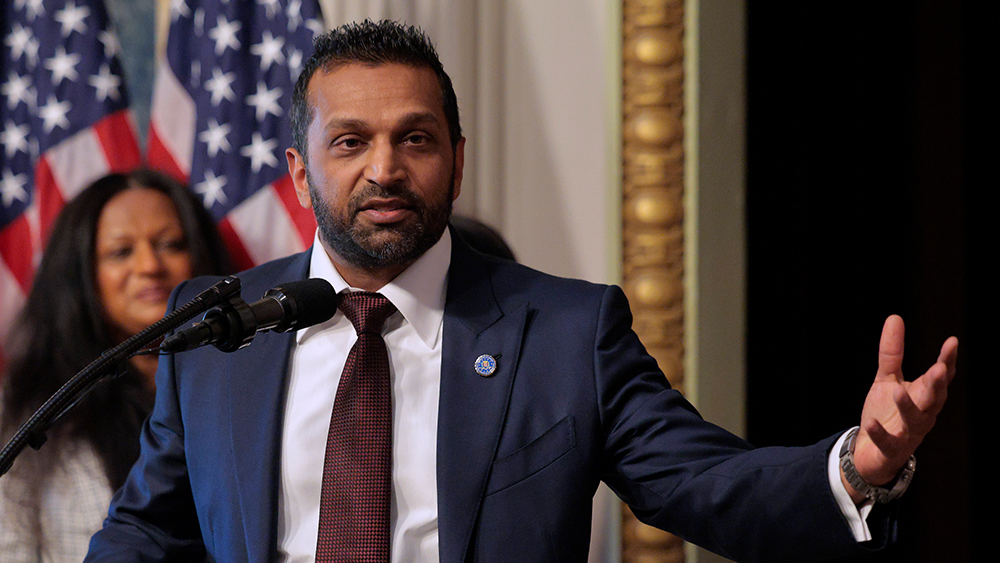The Trump-Palantir coup: How the company’s stance on privacy for American citizens is under threat
06/03/2025 / By Willow Tohi

- The Trump administration has awarded Palantir Technologies $1.3 billion in contracts to amass federal data, jeopardizing privacy.
- Critics warn of misuse of sensitive citizen data, citing Palantir’s history in invasive projects like ICE migrant tracking and collaboration with a firm targeting WikiLeaks.
- Over a dozen Palantir employees, including engineers, have rebelled, citing ethical concerns over data aggregation for political purposes.
- Elon Musk’s Department of Government Efficiency (DOGE), linked to Palantir through former employees, drives the data centralization push.
- Litigation by privacy advocates and legal groups challenges the administration’s power grabs, raising fears of surveillance overreach.
In a move critics call a tyrannical encroachment, the Trump administration is harnessing Palantir Technologies — a firm co-founded by hard-right billionaire Peter Thiel — to centralize massive amounts of sensitive U.S. citizen data across federal agencies. Since President Trump’s inauguration, Palantir has received over $1.3billion in contracts, including a $795 million Department of Defense award, to deploy its Foundry system, which merges disparate datasets. This “data lake” project, driven by Elon Musk’s controversial Department of Government Efficiency (DOGE), could enable unprecedented surveillance powers, with bipartisan privacy advocates condemning it as a threat to civil liberties. The plan, spurred by an executive order targeting “information silos,” has sparked internal dissent at Palantir, lawsuits by rights groups, and stark warnings over security flaws.
Billion-dollar contracts fuel a federal data monoculture
The administration’s financial stake in Palantir has grown exponentially since the November election. Contracts for Foundry — a tool organizing taxpayer records, healthcare data, and immigration files — now span at least four agencies, including ICE, the Department of Health and Human Services and the IRS. By consolidating disparate databases, officials could potentially cross-reference details like Social Security numbers, student loans, and medical histories, enabling targeting of critics or undocumented migrants.
Palantir’s Foundry was already credited with tracking migrants in real time under a $30 million ICE contract. Meanwhile, engineers worked to centralize IRS records, while DOGE officials lobbied to merge Social Security and immigration data. The firm’s expansion into revenue-focused agencies like the IRS suggests a financial SWAT team prioritizing partisan efficiency over privacy, critics argue.
“This amounts to a data iceberg; what floats now is terrifying, but we don’t know what’s hidden beneath,” warned Linda Xia, a former Palantir engineer who co-signed a letter urging the company to halt its “reckless” collaboration.
Employees turn whistleblowers as ethics crumble
Behind the scenes, Palantir faces an internal revolt. Over a dozen former staff signed onto a recent editorial decrying the profit-driven erosion of their company’s ethical reputation. Brianna Katherine Martin, a departing strategist, posted on LinkedIn that her “red line” was crossed after the firm expanded ICE contracts. Current employees cited lax security practices among DOGE personnel, including unsecured devices, which could expose databases to hacking — or abuse.
“The concentration of this data in a single system increases the risk of both breaches and political weaponization,” said Mario Trujillo of the Electronic Frontier Foundation. “A system designed to catch illegal immigrants could easily be used to silence dissenters.”
Palantir claims it serves as a “data processor,” denying responsibility for policy misuse. But its longtime role in militarized projects — from founding with the Pentagon in 2003 to aiding ICE—underscores its instrumentalization by power-hungry regimes.
Palantir’s controversial legacy
Palantir’s involvement in invasive state projects predates Trump. In 2010, it partnered with HBGary to suppress WikiLeaks after the site exposed Bank of America’s misconduct, a move seen as targeting free speech. A 2024 court filing also revealed Palantir engineered a flaw in FBI software that allowed unauthorized access to classified files. Its role in Biden-era CDC vaccine distribution ameliorated some reputational blows, but its ties to Thiel deepen public distrust.
Now, as Palantir’s stock surges (up 140% since Trump’s return), the firm risks cementing its image as a tool for authoritarian governance. “We’re not just facing a data breach—we’re witnessing the collapse of institutional check,” said Xia.
Legal and political resistance grows
Civil liberties groups have launched 11 lawsuits challenging the data project, arguing it violates privacy and due process. Democrats and progressive advocates accuse Trump of weaponizing tedium against critics, while libertarian Republicans decry the invasive scale. Even Palantir CEO Alex Karp (a Democratic donor) recently praised Musk as a “qualified” government reformer—a contradiction criticized as corporate opportunism.
The White House deflected inquiries, citing the original executive order’s “efficiency” mandate. But as more Palantir engineers flee and dissent grows, the administration’s technocratic blueprint risks becoming a liability—and a blueprint for future resistance against surveillance states under any party.
The price of convenience in the surveillance economy
With Palantir’s datasets growing and public trust eroding, the Trump administration has set a dangerous precedent linking federal overreach with Silicon Valley profit. While the administration frames its efforts as commonsense modernization, critics see a dystopian vision of power — a vision where every American’s life is itemized, monitored and politicized. As whistleblower employees and legal challenges grow, one question remains piercing: Who appoints the guardians of such colossal data systems?
Sources for this article include:
Submit a correction >>
Tagged Under:
big government, civil rights, computing, conspiracy, cyber war, Dangerous, deception, deep state, freedom, Glitch, government debt, information technology, Liberty, national security, outrage, privacy watch, Resist, revolt, Suppressed, surveillance, Trump, Tyranny, uprising, Whistleblower, White House
This article may contain statements that reflect the opinion of the author
RECENT NEWS & ARTICLES
COPYRIGHT © 2017 RESIST NEWS



















